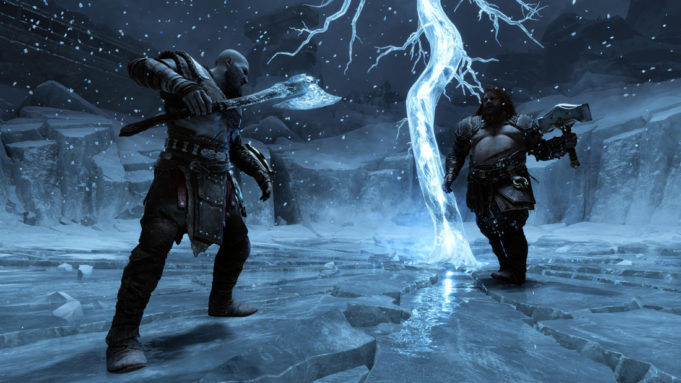God of War (2018) stood as maybe the highest peak in the mountain range of Best Games of the Eighth Console Generation. With intricate, brutal combat and a memorable, emotional story, it managed to elevate the series as it transplanted Greek god of war and deity-slaughterer Kratos to Norse mythology. Now, we’re in the ninth generation, and Kratos has to contend with not just dragons and draugrs but fierce competition such as Elden Ring while also measuring up to higher graphical standards and four years of expectations. Thankfully, God of War Ragnarok is ready to surpass those expectations and slay its competition.
Picking up a few years after the last game, Kratos (Christopher Judge in a Game Awards-winning performance) and son Atreus (Sunny Suljic) begin Ragnarok on the run from vengeful gods and trying to survive Fimbulwinter, the years-long cold that predates Ragnarok, when all Nine Realms of Norse mythology are said to be destroyed. No pressure for a god like Kratos, who saw to the end of his own mythos. Except his son wants to face those prophecies head on, drawing the ire of Odin (Richard Schiff), who has a keen interest in preserving his realm of Asgard and isn’t taking too kindly to interlopers. One battle with Thor (Ryan Hurst) later, and Kratos and Atreus are on the run, looking for the presumed-dead Norse god of war Tyr and seeking a way to stop Odin’s plans.
“Be better” was a running theme of the last game, and it continues here, expanding both story and gameplay. Play-wise, things remain much the same, divided between exploration, a little light puzzle solving, and killing everything that gets in your way. Exploration now has Kratos boating and sledding across various wider though not quite open-world areas, with even more sidequests to complete, optional bosses to battle, and collectibles to, well, collect than in the last game. This also means lots of conversations between the characters as they traverse, from the telling of deeply hidden secrets to fun little moments. (Atreus: “Dad, do you ever think I’ll grow a beard like yours?” Kratos: “No.”) Puzzles also make better use of all of Kratos’ arsenal, and a few can be real mind benders.
But let’s talk about the series’ main draw: combat. The camera remains fixed behind Kratos as the Leviathan Ax and the Blades of Chaos, along with Atreus as support, are used to slash, smash, decapitate, and disembowel everything that sees your 6-foot-4-inches of muscular godly rage and thinks, “Yeah, I’m the one that’s gonna beat him!” Like in too many series (looking at you, Metroid), you start without a lot of the things you earned in the last adventure, so some skills have to be relearned. However, combat is even more involved, with more weapon skills, armor choices, shields, and skill trees that allow players to customize Kratos to whatever playstyle they see fit. Still, it all comes down to skill-based combat over making a strong character build, so those who like min-maxing are only going to get so far.
Graphically, the game hasn’t undergone any major upgrades, which is to say, it’s still stunningly beautiful and full of some of the most impressive vistas and creatures ever seen in a video game. And running on the PS5 at 60 frames per second makes everything that much smoother. There were a few bugs but only some rare object pop-in and awkward character animations, nothing game breaking.
Story-wise may be the only way the game isn’t better. Not that it’s bad at all. It’s longer, adds tons of new and interesting characters, takes more than a few turns leading up to an epic climax, and tugs on a few heartstrings, but it doesn’t quite reach the emotional highs the previous game did. Ragnarok also still has some of what I call “video game bullshit,” such as when a god like Kratos needs to solve a puzzle to get around a 5-foot-high fence. Combined with more usage of his arsenal for platforming and the bigger areas, and the game feels like it’s butting against its design limitations. I’m not saying a hundred hours-long open-world revolution is necessary, but this series can definitely expand even further.
But minor graphical hiccups and complaints about the story not being as good as the one before say more about how excellent the previous game was — just, like, a half-point higher on the ol’ superfluous numerical scoring system. This game is an enriching experience, one that made me feel like my life was better for having played it, and that kind of experience doesn’t get much better than here.












